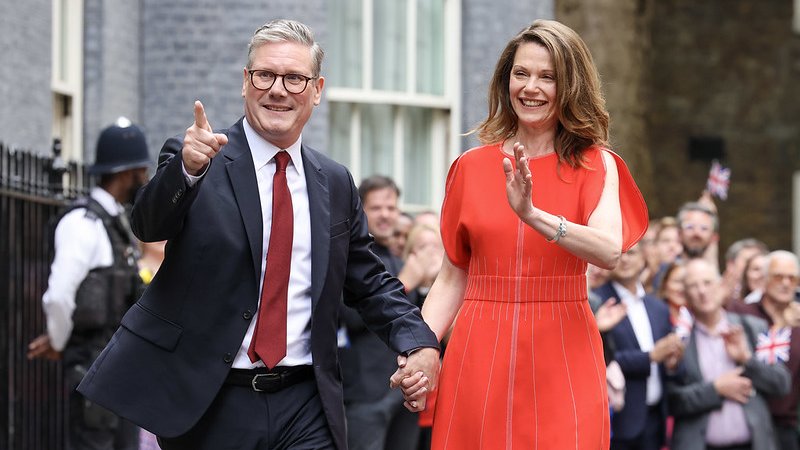
“I’d like to know if you two are really the best the job of Prime Minister has to offer,” one voter dryly asked during the debate between Rishi Sunak and Keir Starmer. Judging by one of the highest abstention rates (almost 40%) in the history of British elections, this is a question that many UK workers and young people were asking themselves on Thursday.
Millions of people voted against the Conservative Party, which has been in power for the past 14 years and has been responsible for Brexit, a financial crisis, recession, the collapse of the public hospital and the impoverishment of the working class. Another section of voters alternated between apathy and resignation. And for good reason: the alternative to the Conservatives was very bad. Their defeat is explained more by the crisis of the Conservatives than by the virtues of Starmer’s Labour Party.
The Labour Party, under Keir Starmer, has revived the neoliberal tradition of Tony Blair’s New Labour: a hard left on security and immigration issues, and conciliatory with the bosses on economic issues.
After Jeremy Corbyn’s decade of neo-reformism at the helm of Labour, which brought hundreds of thousands of young progressive activists back into the party by promising them a programme of nationalisation of transport and the energy sector, an end to university tuition fees and even massive investment in public services, Labour’s right-wing wing has taken revenge in recent years, purging almost the entire left wing of the party, with Corbyn at its head.
British editorialists had been fervently comparing the Labour manifesto under Corbyn to Mao Zedong’s Little Red Book. However, as for the Labour manifesto under Starmer, almost everyone agrees that it is the Conservative programme dyed red.
Amid a huge outpouring of solidarity on the streets with the Palestinian people, both Sunak and Starmer agreed to unwaveringly support Israel’s “right to defend itself”, that is, the right to continue the genocide against the Palestinian people, long before adopting a timid position in favour of a “cessation of hostilities”.
Labour and the Conservatives also agree on the need to reduce immigration by brutal means. Labour and the Conservatives agree on the need to pursue a “responsible” fiscal policy that is open to dialogue with companies and investors, on the refusal to increase taxes on companies, as well as on making the financing of social assistance and public services conditional on economic recovery. With this openly pro-business programme, it is not surprising that even bourgeois media such as the Financial Times or The Economist have officially supported Keir Starmer’s candidacy.
If the Labour Party emerged victorious, it is mainly thanks to the specifics of the voting method for general elections in the United Kingdom: there is no second round and whoever gets the most votes wins the seat in parliament, even with a small difference in votes. This process favours the two parties of the regime that have alternated in power since the beginning of the 20th century, hindering the emergence of new political groups.
In 2024, the Labour Party lost hundreds of thousands of votes compared to 2019 and millions compared to 2017, but it is rewarded with a supermajority of 411 seats out of 650 in the House of Commons. This is despite the fact that part of its base has turned to the Greens and pro-Palestinian independent candidates, including Jeremy Corbyn.
The Conservatives’ electoral base, especially in the middle and working classes, has been significantly eroded, to the benefit of Nigel Farage’s far-right Reform UK party and the Liberal Democrats (who made a big gain, with 71 seats), but the Conservative Party remains on 121 seats. Although Reform UK won 14% of the vote, not far from the Conservatives’ 21%, it only won 4 seats.
Where is Britain headed? If Keir Starmer is to be believed, the results of this election promise “a ray of hope” and major changes. In reality, Labour will inherit the same spiral of economic decline and disintegration of influence into which the country fell after the 2008 financial crisis and Brexit. The saturation and collapse of public services will continue, the queues at food banks will continue to lengthen, and unemployment will continue to reinforce the feeling of humiliation in many households.
Even before coming to power, Labour has already broken many of its old promises, such as investing £28m in the green transition and repealing university tuition fees. The change promised by Labour will be a continuation of austerity and neoliberal policies and will deepen the tendencies towards political crisis in the UK, which will continue to pave the way for the far right.
Beyond this more general dynamic between the regime parties, there are also the millions of people in the UK who have taken part in strikes in the health and education sectors, among others, in recent years or who have shown solidarity with the Palestinian people, and who have been attacked for this by both Conservatives and Labour. In the near future, these workers and young people, whose voice is not represented by any party of the regime, will also have a say in the future of their country. And to express this will not be enough with a vote at the ballot box.
Source: www.laizquierdadiario.com

